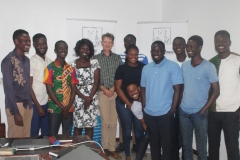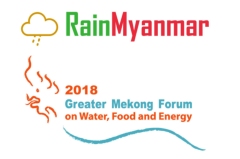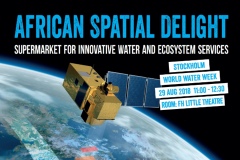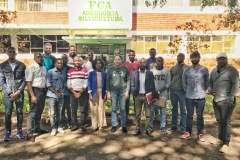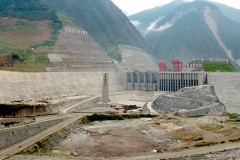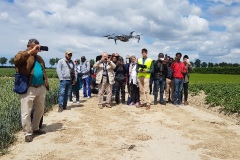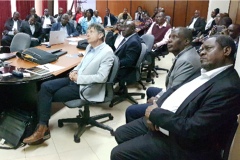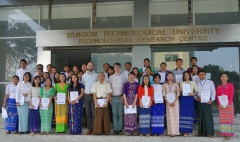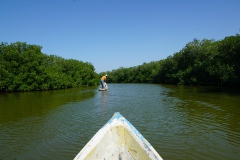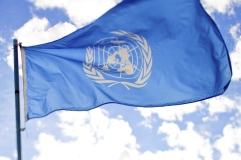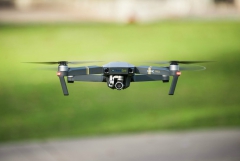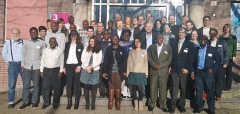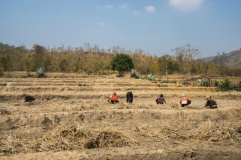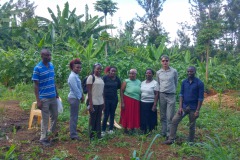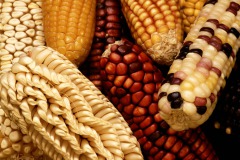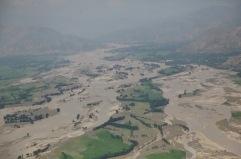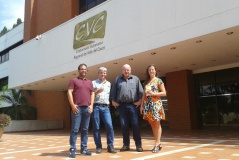News in 2018
28 December 2018
TWIGA Blog: Successful drone training at KNUST in Kumasi, Ghana
Eleven motivated participants. A Flying Sensor. A challenging task to perform. Perfect facilities (Thank you Mr Isaac Duodu from Kumasi Business Incubator!). The right assistance (Mr Joel Budu from Farmerline!). That’s what it takes to perform a week’s training and finish it successfully. Coming from different professional backgrounds most of the trainees did not know...
11 December 2018
Socio-economic development is the key driver for the future South Asian water gap
The current United Nations Climate Change Conference COP24 held in Katowice, Poland once more demonstrates the world’s climate change concerns. In the Indus, Ganges, and Brahmaputra river basins, a global climate change hotspot and home for about 900 million people, these concerns are pressing, since the river systems provide water resources for the important agricultural,...
7 December 2018
Satellite technology and drone images to reduce groundwater use in Iran
The SMART-WADI project (SMART Water Decisions for Iran), carried out by a consortium of FutureWater, IHE-Delft, and local partner EWERI, focuses on farmers who irrigate their crops with groundwater. The aim is to provide up-to-date information and advice on water productivity, irrigation and farm management. The project combines the latest satellite technology for the quantification...
30 November 2018
FutureWater to launch RainMyanmar at the 2018 Greater Mekong Forum on Water, Food and Energy
Although rainfall stations continue to be an irreplaceable source of data, satellite-derived products provide valuable additional information on spatial patterns and remote sites where no stations are present. Thanks to Google Earth Engine, these data products are now publicly available and can improve water management policies, practice and research worldwide. RainMyanmar is an app targeted...
26 November 2018
Even 1.5 degrees is too much for South Asia
The river basins of the Indus, Ganges and Brahmaputra in South Asia are seen as climate change hotspots. These river basins, which are largely fed by mountain water are home to a population around 900 million people, which is likely to increase to al 1 billion halfway the 21st century. Climate change is expected to...
29 October 2018
Successful BRIGAID project meeting in Cartagena, Spain
During October 17, 18 and 19, several activities co-organized by FutureWater and Icatalist took place in Cartagena in the framework of the 6th Regular Meeting of the EU-H2020 BRIGAID project. During the first day, a selection of innovators, users and financing actors from the region and the rest of Europe were gathered around a thematic...
17 September 2018
Press release: Traditional Japanese cuisine is under threat from global water problems
Water scarcity and extreme weather events – both now and under climate change – outside Japan’s borders are expected to pose an increasing risk to Japan’s agri-food importers and to the wider consumer market. In Japan, many traditional culinary ingredients such as rice, edamame, miso and tofu (soybean products) – as well as increasingly popular...
9 August 2018
Stockholm World Water Week 2018: FutureWater will present ThirdEye’s Water Productivity service
FutureWater will participate in the African Spatial Delight side event of the Stockholm World Water Week 2018, convened by VIA Water, AfriAlliance and the G4AW programme of the Dutch government. The ThirdEye service of FutureWater and HiView, currently applied in Mozambique, Kenya and Ghana, is one of the innovations that will be presented and demonstrated...
9 July 2018
FutureWater gives Remote Sensing and Agricultural Services Course in Angola
The Government of Angola is developing a policy to diversify the country’s economy, strongly dependent on the income of the oil sector. Agriculture is considered one of the priority sectors to be developed. A favorable climate and a relatively high availability of water resources and fertile soils, can lead Angola to become one of the...
5 July 2018
Mekong State Of the Basin Report 2018: FutureWater prepares Upper Mekong Chapters
The Mekong State Of the Basin Report (SOBR) is published by the Mekong River Commission (MRC) every five years, in advance of the cyclic updating of the Basin Development Strategy. The SOBR plays a key role in improving monitoring and communication of conditions in the Mekong Basin, and is MRC’s flagship knowledge and impact monitoring...
21 June 2018
FutureWater and HiView give lectures on the use of flying sensors
Last week FutureWater, together with its partner HiView, gave 2 days of lectures at IHE Delft Institute for Water Education, which partners with UNESCO. As part of their master degree, around 25 students were taught on the theory behind flying sensors (also known as drones), the different types of applications and how to use them...
1 May 2018
Seminar on the use of flying sensors in agriculture held in Kenya
In a bid to create and increase more awareness on the use of flying sensors (drones) in agriculture, FutureWater and HiView, held a seminar on March 2, 2018 at the KALRO (Kenya Agricultural & Livestock Research Organization) Headquarters in Nairobi, Kenya. The seminar was attended by KALRO researchers, representatives of SNV, government employees, as well...
12 April 2018
Training on Google Earth Engine for water resource analysis organized in Myanmar
Last month, the training Cloud computing for water resource analyses in Myanmar using Google Earth Engine, executed by FutureWater and HKV, was successfully conducted at Yangon Technological University (YTU), Yangon, Myanmar. The training was organized in the framework of the Leapfrogging Delta Management in Myanmar, led by Delft University of Technology (TU Delft) and funded...
3 April 2018
Third HERMANA project mission to present beta version of the Water Management Information Center
From 5 to 9 March 2018, staff people of the HERMANA project presented the first version of the Water Management Information Center (WMIC) for the Cauca Valley Basin at the CVC headquarters in Cali, Colombia. This information center aims to be the cornerstone for supporting the decision-making process at the technical and institutional levels in...
22 March 2018
FutureWater research cited in United Nations report
Today, 22 March 2018, is World Water Day. Like every year on the 22nd of March this day is about focusing attention on the importance of water. The theme for World Water Day 2018 is ‘Nature for Water’ – exploring nature-based solutions to the water challenges we face in the 21st century. In its World...
9 March 2018
ThirdEye makes drone technology accessible for African farmers
In the Netherlands, drones already play an important role in agriculture: from the air they can monitor the growth of crops very precisely. Here high-quality sensors and relatively expensive drones are used. Thanks to these sensors and special software the needs of the crops (e.g. water, fertilizer or plant protection products) can be calculated. “A...
15 February 2018
New Horizon 2020 project TWIGA officially started
Last week the kick-off meeting took place of a new Horizon 2020 project TWIGA; Transforming Water, weather, and climate information through In situ observations for Geo-services in Africa. The project aims to provide actionable geo-information on weather, water, and climate in Africa through innovative combinations of new in situ sensors and satellite-based geo-data. With the...
1 February 2018
New IMPREX policy brief: EU’s vulnerability to climate change impacts outside its borders
Climate change is leading to increased water scarcity and drought in many parts of the world. This has implications for the European Union (EU) because a lot of the goods consumed or used in the EU are produced abroad. This makes its economy dependent on water resources from beyond its borders. As part of the...
19 January 2018
First ThirdEye flying sensor operators trained in Kenya
The ThirdEye project supports farmers in Kenya by setting up a network of flying sensors operators. These operators are equipped with flying sensors and tools to analyse the obtained imagery. In December ThirdEye staff conducted an intensive two weeks flying sensor training at Agricultural Training Centre (ATC) Kaguru, 15 km south of Meru, Kenya. The...
9 January 2018
Study conducted on water productivity mapping using flying sensors and crop modeling
Recently, FutureWater conducted a study for RVO to test the feasibility of mapping water productivity and yield gaps based on a combination of Flying Sensor imagery and crop water productivity modeling in order to provide plot-level recommendations to farmers. The objective of this pilot study was to achieve plot-level maps of water productivity and yield...
4 January 2018
Climate change will result in increased hydrological extremes in the upstream domains of the Indus, Ganges, and Brahmaputra
Hydrological extremes, such as the South Asian monsoon floods of last year, have a devastating impact on a society. Evidence suggests that hydrological extremes are increasing. To reduce the adverse impacts of hydrological extremes, adaptation strategies need to be developed, which requires knowledge on which drivers/processes are responsible for changes in hydrological extremes. For this...
2 January 2018
FutureWater started the HERMANA project with two missions to the Cauca Valley Corporation
Two missions in September and October 2017 were held in Calí, Colombia as the starting point of the HERMANA project. During these missions, the HERMANA team, composed by staff from Deltares, FutureWater, and the Dutch Water Authorities, shared Dutch and Colombian experiences in water monitoring, management and governance. Furthermore, they identified the main functional and...
